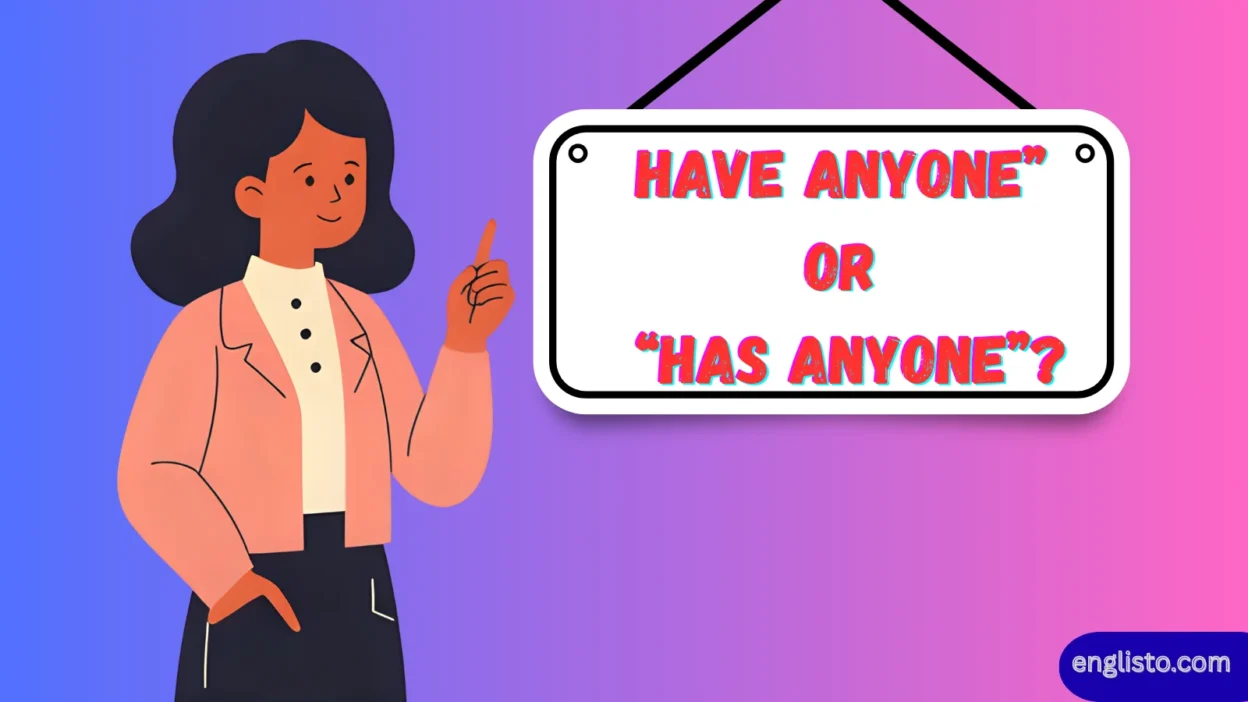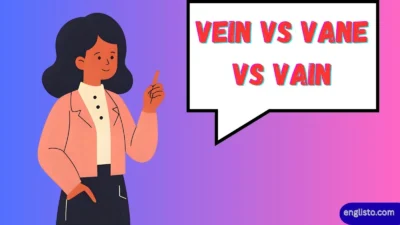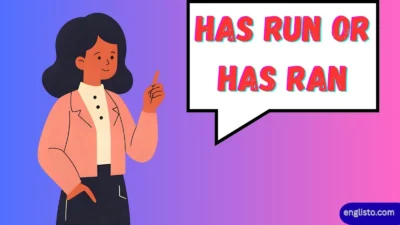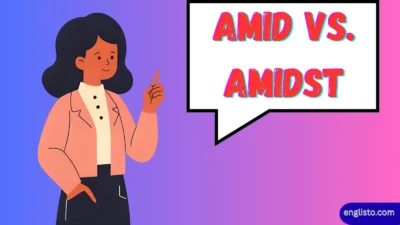Learning English can feel like a puzzle made up of small, tricky pieces. One of those pieces is deciding whether to say “have anyone” or “has anyone.”
At first glance, both sound possible — but only one is grammatically correct in standard English.
This guide explains exactly why that is, how to use it properly, and how to recognize the correct form in real-life situations. We’ll explore examples, comparisons, and grammar logic in detail — all in plain, conversational English.
Understanding the Confusion
The confusion starts because “anyone” sounds like it might refer to more than one person. After all, any one could be “any person out of a group,” right?
But English doesn’t see it that way.
Grammatically, “anyone” is singular.
And that single fact changes everything.
Quick Answer
✅ Correct: Has anyone
❌ Incorrect: Have anyone
Example:
- “Has anyone seen my wallet?”
- “Have anyone seen my wallet?” → ❌ Wrong
Why? Because “anyone” acts like he, she, or it — it’s singular. So it must take has, not have.
What Does “Anyone” Really Mean?
Let’s look closer.
| Word | Meaning | Type | Number |
| Anyone | Any single person, whoever they may be | Indefinite pronoun | Singular |
| Someone | A particular but unnamed person | Indefinite pronoun | Singular |
| Everyone | All people, considered as a unit | Indefinite pronoun | Singular |
| No one / Nobody | Not a single person | Indefinite pronoun | Singular |
All of these pronouns refer to people in general, not specific individuals. But grammatically, each counts as one.
So just as we say “He has,” “She has,” “It has,” — we must also say “Anyone has.”
The Grammar Rule: Subject–Verb Agreement
English verbs must agree with their subjects in number (singular/plural).
Here’s a simple refresher:
| Subject | Verb Form | Example |
| I / You / We / They | have | “They have finished.” |
| He / She / It / Anyone | has | “He has finished.” / “Has anyone finished?” |
Because anyone behaves like he/she/it, it always pairs with has in the present perfect tense.
When to Use “Has Anyone”
You’ll use “has anyone” mainly when asking questions or making statements in the present perfect tense — to refer to something that happened at an unspecified time before now.
Structure:
Has + subject + past participle
Examples
- “Has anyone seen my keys?”
- “Has anyone ever been to Japan?”
- “Has anyone called while I was out?”
- “Has anyone told you the news yet?”
- “Has anyone noticed the typo on the sign?”
It’s also used in negative questions:
- “Hasn’t anyone finished yet?”
- “Hasn’t anyone told her?”
All these follow the same rule — “has” because the subject (“anyone”) is singular.
When You Might Hear “Have Anyone”
You might hear “have anyone” in informal speech or in songs, but that doesn’t make it correct in standard English.
People sometimes confuse it because they think “anyone” means “any people.”
However, “people” is plural, “anyone” is not.
Example of Incorrect Use
❌ “Have anyone tried the new game?”
Corrected
✅ “Has anyone tried the new game?”
If you really mean to talk about multiple people, use:
✅ “Have any people tried the new game?”
✅ “Have they tried the new game?”
So the word choice — anyone vs any people — determines whether you use has or have.
Common Mistakes Learners Make
Here’s a table showing frequent errors and how to fix them:
| ❌ Incorrect Sentence | ✅ Correct Sentence | Why |
| Have anyone told you yet? | Has anyone told you yet? | “Anyone” is singular. |
| Do anyone know? | Does anyone know? | “Anyone” needs singular “does.” |
| Don’t anyone move! | Doesn’t anyone move! | Wrong auxiliary for singular subject. |
| Have anyone came? | Has anyone come? | “Has” + past participle form “come.” |
| Have anyone called me? | Has anyone called me? | Singular “anyone” = “has.” |
The Rule in Different Tenses
Let’s see how “anyone” behaves in other tenses and forms.
| Tense | Auxiliary | Example |
| Simple Present | Does | “Does anyone know the answer?” |
| Present Perfect | Has | “Has anyone seen my phone?” |
| Past Perfect | Had | “Had anyone told you before the meeting?” |
| Future Perfect | Will have | “Will anyone have arrived by then?” |
| Present Continuous | Is | “Is anyone waiting outside?” |
| Past Continuous | Was | “Was anyone crying?” |
Notice how “have anyone” doesn’t appear correctly in any tense pattern.
Real-Life Usage Examples
Here are sentences from real, natural conversations:
- “Has anyone seen the cat? I can’t find her.”
- “Has anyone called the doctor yet?”
- “Has anyone told Mark what happened?”
- “Has anyone ever told you you’re funny?”
- “Has anyone noticed that it’s getting colder?”
Each uses “has anyone” correctly in context.
Negative & Question Forms
Both positive and negative question forms follow the same rule:
| Type | Example |
| Positive Question | “Has anyone called?” |
| Negative Question | “Hasn’t anyone called?” |
| Statement | “If anyone has called, I didn’t hear it.” |
Even when negative or conditional, “has” stays constant.
Idiomatic and Natural Expressions
You’ll often hear these phrases in everyday English:
- “Has anyone ever told you that you look just like your dad?”
- “Has anyone else noticed how quiet it is?”
- “Has anyone got a pen?” (Common in British English)
- “Hasn’t anyone thought of that before?”
Tip
In British English, “Has anyone got” = “Does anyone have.”
In American English, you’d more often hear:
“Does anyone have a pen?”
Both are correct depending on dialect.
Singular vs. Plural Logic
It can help to visualize this rule using a comparison table:
| Word | Singular or Plural? | Correct Verb | Example |
| Anyone | Singular | Has | “Has anyone seen my phone?” |
| Everyone | Singular | Has | “Everyone has a ticket.” |
| Someone | Singular | Has | “Someone has taken it.” |
| No one | Singular | Has | “No one has arrived yet.” |
| They / People / Students | Plural | Have | “They have finished.” |
So even though anyone might refer to “one of many,” grammatically it always behaves as singular.
Difference Between “Has Anyone” and “Does Anyone”
It’s easy to confuse these two, but they belong to different tenses:
| Form | Tense | Example | Meaning |
| Has anyone | Present perfect | “Has anyone seen my notebook?” | Something may have happened already (unspecified time). |
| Does anyone | Simple present | “Does anyone know where it is?” | Asking about a current state or general fact. |
So:
- Use “has anyone” when referring to past actions with present relevance.
- Use “does anyone” when asking about general truths or current knowledge.
Compound Subjects and Exceptions
Normally, “anyone” is used alone, but in rare cases you might see it with another subject.
Example:
“Anyone and someone else have been informed.”
Here, the subject is plural (“anyone + someone else”), so “have” is correct.
But in 99% of real use, “anyone” stands alone — so “has” remains the correct choice.
Using “Anyone” in Different Sentence Types
| Sentence Type | Example |
| Question | “Has anyone seen my umbrella?” |
| Negative Question | “Hasn’t anyone noticed?” |
| Statement | “If anyone has questions, please ask.” |
| Conditional | “If anyone has finished early, you may leave.” |
| Reported Speech | “He asked if anyone had seen the message.” |
All follow the same agreement principle.
Grammar Tip: The Substitution Test
Here’s an easy trick to check yourself:
Try replacing anyone with he or she.
Example:
- “Has anyone arrived?” → “Has he arrived?” ✅
- “Have anyone arrived?” → “Have he arrived?” ❌
If the sentence works with “he” or “she,” your verb is correct.
Difference Between “Anyone” and “Any One”
There’s also a subtle difference between “anyone” (one word) and “any one” (two words).
| Form | Meaning | Example |
| Anyone | Any person at all (indefinite) | “Has anyone called?” |
| Any one | Any specific individual out of a group | “Have any one of them called?” |
So if you truly mean “any individual out of several,” you might use “have any one of…”, but not “have anyone.”
Checking Your Grammar While Writing
When in doubt, do these three quick checks:
- Identify the subject.
→ Is it singular or plural? - Check your auxiliary verb.
→ “Has” for singular, “have” for plural. - Apply the substitution test.
→ Replace “anyone” with “he/she.”
If it sounds wrong with “he,” it’s wrong with “anyone.”
Real-Life Writing Examples
Let’s see how “has anyone” appears in real-world contexts:
| Context | Example |
| Email inquiry | “Has anyone completed the budget sheet?” |
| Customer service | “Has anyone called the client back yet?” |
| Casual conversation | “Has anyone seen my coffee mug?” |
| Workplace discussion | “Has anyone tested the new software?” |
| Social media post | “Has anyone else noticed how early it gets dark?” |
Each one feels natural and grammatically correct — that’s how you should use it.
Quick Summary Table
| Expression | Correctness | Notes |
| Has anyone seen this? | ✅ Correct | Standard English |
| Have anyone seen this? | ❌ Wrong | Subject–verb mismatch |
| Does anyone have a pen? | ✅ Correct | Present tense |
| Do anyone have a pen? | ❌ Wrong | “Anyone” is singular |
| Has anyone got a pen? | ✅ Correct (British) | Same as “Does anyone have” |
Practice Time
Fill in the blanks with the correct form:
- ______ anyone called me today?
- ______ anyone ever told you that you’re kind?
- ______ anyone finished the project yet?
- By the time I arrived, ______ anyone left?
- ______ anyone got any change?
Answers:
- Has
- Has
- Has
- Had
- Has (British) / Does (American)
Quick Idiomatic Examples
These sound very natural in spoken English:
- “Has anyone ever told you that before?”
- “Has anyone mentioned the update?”
- “Has anyone else noticed how quiet it is?”
- “Has anyone seen my phone charger?”
- “Has anyone got a better idea?”
Myths and Misconceptions
- ❌ “Have anyone” is never correct in standard English.
- ❌ It’s not an accepted dialect in American, British, or Australian English.
- ✅ You may hear it in informal, non-standard speech, but it’s considered incorrect.
So even if people say it casually, always write and speak the correct version — “Has anyone.”
Why Correct Grammar Feels Natural
Native English speakers don’t consciously think about grammar rules — they feel what sounds right.
When you use “has anyone” correctly, your English flows naturally and sounds native.
The wrong version (“have anyone”) instantly signals that something’s off, even if the listener can’t explain why.
That’s the power of grammar awareness: it helps your communication feel smooth, not forced.
Conclusion
So, to sum it all up:
- “Anyone” is singular.
- “Has” is the correct auxiliary verb for singular subjects.
- Therefore, “Has anyone” is always right — and “Have anyone” is always wrong (in standard English).
Use “Has anyone…” when asking questions or making statements about actions that may have happened before now.
If you need to refer to multiple people, switch to “Have they…” or “Have any of them…”
Once you understand that anyone = singular, the rule becomes second nature.
✅ Correct: “Has anyone seen my wallet?”
❌ Incorrect: “Have anyone seen my wallet?”
That’s all there is to it — simple, logical, and easy to remember.
FAQs
1. Why is “Has anyone” correct?
Because “anyone” is singular and requires the singular auxiliary “has.”
2. Can I ever say “Have anyone”?
Not in standard English. Use “Have any people” or “Have they” if you mean plural.
3. What’s the difference between “Has anyone” and “Does anyone”?
“Has anyone” = present perfect; “Does anyone” = simple present.
4. Is “Has anyone got” correct?
Yes, it’s correct in British English; Americans would say “Does anyone have.”
5. How can I check which one to use?
Replace “anyone” with “he.” If “Has he…” sounds right, then “Has anyone…” is correct.



